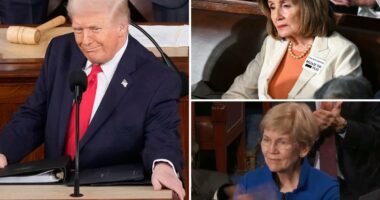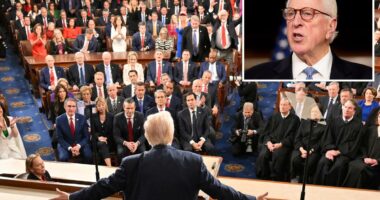Share this @internewscast.com
Cryptocurrency has evolved beyond being a niche subject for tech aficionados and online communities. It’s now a formidable force impacting elections, policy-making, and the country’s economic direction. At Crypto File, we explore how crypto super PACs have emerged as a significant political influence in American politics.
Tyler and Cameron Winklevoss, the minds behind the Gemini cryptocurrency exchange, recently contributed $21 million in Bitcoin—around 188.45 BTC—to a nascent super PAC known as the Digital Freedom Fund. This decisive action highlights the crypto sector’s robust drive to position the United States as the global hub of blockchain innovation. As the 2026 midterm elections approach, a surge in financial backing for candidates endorsing pro-crypto platforms is anticipated, especially those supporting President Donald Trump’s ambition of making America the “crypto capital of the world.”
Rise of the Crypto Super PAC
The Winklevoss donation exemplifies a burgeoning trend of crypto interests channeling vast sums into political action committees (PACs) to sway legislative frameworks. This is not merely about philanthropy; crypto has emerged as a new establishment power, altering Washington’s handling of digital assets.
The Digital Freedom Fund PAC is poised to support Trump policy allies in primary and midterm contests. It advocates for key measures like the “Skinny Market Structure Bill,” featuring a “Bitcoin and Crypto Bill of Rights.” This initiative seeks to safeguard the rights to own, self-custody, and conduct peer-to-peer digital transactions without excessive government intervention. It further demands protections for software developers akin to Section 230 liability shields, opposes central bank digital currencies (CBDCs) labeled as “totalitarian,” and ensures fair banking access for crypto enterprises.

This contribution is part of a broader trend of industry financing. Titans such as Coinbase, Andreessen Horowitz (a16z), and Ripple Labs have pledged substantial amounts to PACs like Fairshake, which has built an impressive $141 million fund. During the 2024 election cycle alone, crypto-backed organizations expended over $130 million, aiding the election of many industry-sympathetic legislators and steering policy shifts during Trump’s tenure.
Trump Fulfills Campaign Promises
Formerly a vocal opponent who labeled Bitcoin as a “scam,” Trump shifted his stance during his campaign, vowing to establish the U.S. as a leading crypto hub. Adhering to timelines and budgets, his executive measures, including setting up a Strategic Bitcoin Reserve and amassing a digital asset portfolio, as mentioned in the recent Whitehouse Report, have invigorated the industry. The GENIUS and CLARITY Acts, along with the SEC’s “Project Crypto,” are paving the way for transitioning the $330 trillion U.S. capital markets to public blockchains.
Proponents argue that these measures will unleash innovation, attract global talent, and add trillions to the U.S. economy through widespread adoption of technologies like decentralized finance (DeFi) and stablecoins. Critics, however, raise concerns about market volatility, inadequate consumer protections, and the potential for financial instability. Despite these debates, the industry’s momentum is unstoppable, especially with Bitcoin prices hovering near all-time highs and a stampede of institutional adoption.
As the 2026 midterms approach, control of Congress hangs in the balance, with Republicans holding slim majorities. Crypto PACs are strategically targeting key races to defend pro-crypto incumbents and oust skeptics. Groups like Fairshake and its affiliates—Protect Progress and Defend American Jobs—had over $116 million on hand as of early 2025. Their approach is bipartisan but leans toward candidates scoring high on platforms like Stand With Crypto, a Coinbase initiative rating politicians on digital asset stances.
The Crypto Incumbents
Senate races feature several Republican incumbents poised to benefit from industry support. For instance, Cynthia Lummis of Wyoming, a staunch Bitcoin advocate, has co-sponsored bills like the Lummis-Gillibrand Responsible Financial Innovation Act and pushed for a national Bitcoin reserve. She’s expected to run for reelection, emphasizing self-custody rights and opposing CBDCs. Similarly, Bill Hagerty of Tennessee advocates for regulatory clarity to prevent innovation from fleeing overseas. In North Carolina, Thom Tillis supports stablecoin oversight and balanced rules for growth. Joni Ernst of Iowa highlights crypto’s potential for rural economies, while John Cornyn of Texas pushes for regulations that keep jobs domestic. Tommy Tuberville of Alabama endorses crypto as the “future of finance.”
On the Democratic side, opportunities are limited, but some like Jon Ossoff in Georgia could pivot toward pro-innovation positions in battleground states. However, the industry is aggressively targeting anti-crypto figures, such as former Senator Sherrod Brown of Ohio, who faced $40 million in opposition spending in 2024 and is eyeing a 2026 run. Brown’s scrutiny of crypto firms as Senate Banking Committee chair makes him a prime adversary.
House races, with all seats up for grabs, also draw attention. Incumbents like French Hill of Arkansas, who authored the CLARITY Act, and Tom Emmer of Minnesota, a critic of SEC overreach, are seen as champions. Even Democrats like Ritchie Torres of New York and Ro Khanna of California have advocated for crypto, potentially earning cross-party support. Many of these candidates supported landmark bills like the GENIUS Act (passed Senate 68-30, House 308-122 in 2025) and the CLARITY Act (passed House 294-134; pending Senate).
Wyoming Stablecoin Example
Mark Gordon, Governor of Wyoming has become a power of example for state candidates. During the Wyoming Blockchain Symposium, the state announced the launch of FRNT, the first state backed stablecoin which could set an example for state budgeting. FRNT plans to allocate earnings on stablecoin reserves to offset state operating budgets, a controversial strategy that speaks directly to taxpayers on how to finance the government and reduce taxes. Private stablecoins like Tether and Circle retain earnings on reserves to increase shareholder equity.
Power, Crypto and Influence
To illustrate the key players, here’s a table of prominent Republican pro-crypto candidates:
| Candidate Name | State | Chamber | Basis for Pro-Crypto Position |
|---|---|---|---|
| Cynthia Lummis | Wyoming | Senate | A leading crypto advocate in Congress, Lummis has co-sponsored multiple bills including the Lummis-Gillibrand Responsible Financial Innovation Act and pushed for a national Bitcoin reserve. She has publicly stated that “Bitcoin is a strategic asset for the U.S.” and opposes CBDCs as “government surveillance tools.” Endorsed by crypto PACs like Fairshake for her self-custody rights advocacy. Expected to run for reelection. |
| Bill Hagerty | Tennessee | Senate | Hagerty has emphasized regulatory clarity to enhance U.S. competitiveness in blockchain, stating in interviews that “overregulation is driving innovation overseas.” He supported the FIT21 Act precursor and has been backed by industry donors for his pro-innovation stance. Expected to seek reelection. |
| Thom Tillis | North Carolina | Senate | Tillis has co-sponsored stablecoin oversight legislation and advocated for integrating crypto into traditional finance. In public remarks, he noted, “We need balanced rules to foster growth without stifling innovation.” Received support from crypto groups in past cycles and is viewed as a moderate ally. Expected to run. |
| Joni Ernst | Iowa | Senate | Ernst has expressed support for innovation-friendly policies, including in committee hearings where she highlighted crypto’s potential for rural economies. Backed by pro-crypto endorsements for her opposition to restrictive oversight; she stated, “America must lead in emerging tech like blockchain.” Expected to seek reelection. |
| John Cornyn | Texas | Senate | As a senior Republican, Cornyn has advocated for “balanced regulation” to prevent crypto jobs from offshoring, per his statements during Senate debates. He supported market structure reforms and has been praised by industry leaders for promoting U.S. leadership in digital assets. Expected to run. |
| Tommy Tuberville | Alabama | Senate | Tuberville has publicly endorsed crypto as “the future of finance,” criticizing overregulation in speeches and supporting bills for clearer guidelines. He received crypto PAC backing in 2020 and has ties to blockchain advocates. Expected to run for reelection. |
| French Hill | Arkansas | House | As chair of the House Financial Services Subcommittee on Digital Assets, Hill authored the CLARITY Act and has stated, “We must provide regulatory certainty to keep innovation in America.” Strongly endorsed by Coinbase and other crypto firms. Expected to run for reelection. |
| Tom Emmer | Minnesota | House | Emmer, the House Majority Whip, has been a vocal critic of SEC overreach, co-sponsoring anti-CBDC bills and stating, “Crypto empowers individuals against big government.” Rated as a “Crypto Champion” by industry trackers and backed by PACs. Expected to seek reelection. |
| Warren Davidson | Ohio | House | Davidson introduced the “Keep Your Coins Act” for self-custody rights and has said, “Crypto is about freedom and decentralization.” Publicly supported by crypto billionaires and groups like Stand With Crypto. Expected to run. |
The PACs driving the funding.
| PAC Name | Current Cash Balance (as of latest available data) | Mission Statement | Major Backers |
|---|---|---|---|
| Fairshake | Approximately $141 million (as of mid-July 2025; includes affiliates Protect Progress and Defend American Jobs) | Fairshake supports candidates committed to securing the United States as the home to innovators building the next generation of the internet. Providing blockchain innovators the ability to develop their networks under a clearer regulatory and legal framework is vital if the broader open blockchain economy is to grow to its full potential here in the United States. | Coinbase, Ripple Labs, Andreessen Horowitz (a16z), Jump Crypto, Uniswap Labs |
| Protect Progress (Fairshake affiliate) | Included in Fairshake’s $141 million network total (no separate breakdown post-July 2025) | Protect Progress supports Democratic candidates committed to securing the United States as the home to innovators building the next generation of the internet. Providing blockchain innovators the ability to develop their networks under a clearer regulatory and legal framework is vital if the broader open blockchain economy is to grow to its full potential here in the United States. | Shared with Fairshake: Coinbase, Ripple Labs, Andreessen Horowitz (a16z) |
| Defend American Jobs (Fairshake affiliate) | Included in Fairshake’s $141 million network total (no separate breakdown post-July 2025) | Defend American Jobs supports Republican candidates committed to securing the United States as the home to innovators building the next generation of the internet. Providing blockchain innovators the ability to develop their networks under a clearer regulatory and legal framework is vital if the broader open blockchain economy is to grow to its full potential here in the United States. (Inferred from network mission; no unique statement found.) | Shared with Fairshake: Coinbase, Ripple Labs, Andreessen Horowitz (a16z) |
| Digital Freedom Fund PAC | Approximately $21 million (as of August 20, 2025; from initial Bitcoin donation) | The mission of the Digital Freedom Fund PAC is to help realize President Trump’s vision of making America the crypto capital of the world. It aims to support champions of Trump’s crypto agenda in primary races and the midterm elections, promote thoughtful market structure legislation, oppose CBDCs, support self-custody and peer-to-peer transactions, protect software developers, and ensure fair banking access for crypto firms. | Tyler Winklevoss, Cameron Winklevoss (Gemini founders) |
| Stand With Crypto PAC | No recent data found (prior cycle: ~$14,000; small-scale) | To raise money from its members for crypto-friendly politicians and endorse bipartisan candidates running in House and Senate races to protect the rights of crypto advocates. | Primarily individual members and small donors; affiliated with Coinbase (no major corporate donors identified for 2025) |
The Road to Midterms
Looking ahead, we predict PACs could attract over $300 million by mid 2026, bolstered by additional contributions from firms like Coinbase and Ripple. Emerging trends, such as public crypto treasury companies and Winklevoss’ Gemini’s 2025 IPO filing, may spawn new PACs, reinforcing the sector’s influence. This influx of capital signals a maturing industry with real political clout, betting on deregulation to drive growth.
The GENIUS and CLARITY Acts aim to create demand for US treasuries, bolster USD hegemony and digitize the $330 trillion US capital markets. With stakes this high, the 2026 midterms are not just about politics and innovation. They will redefine America’s power in global finance and trade.

















